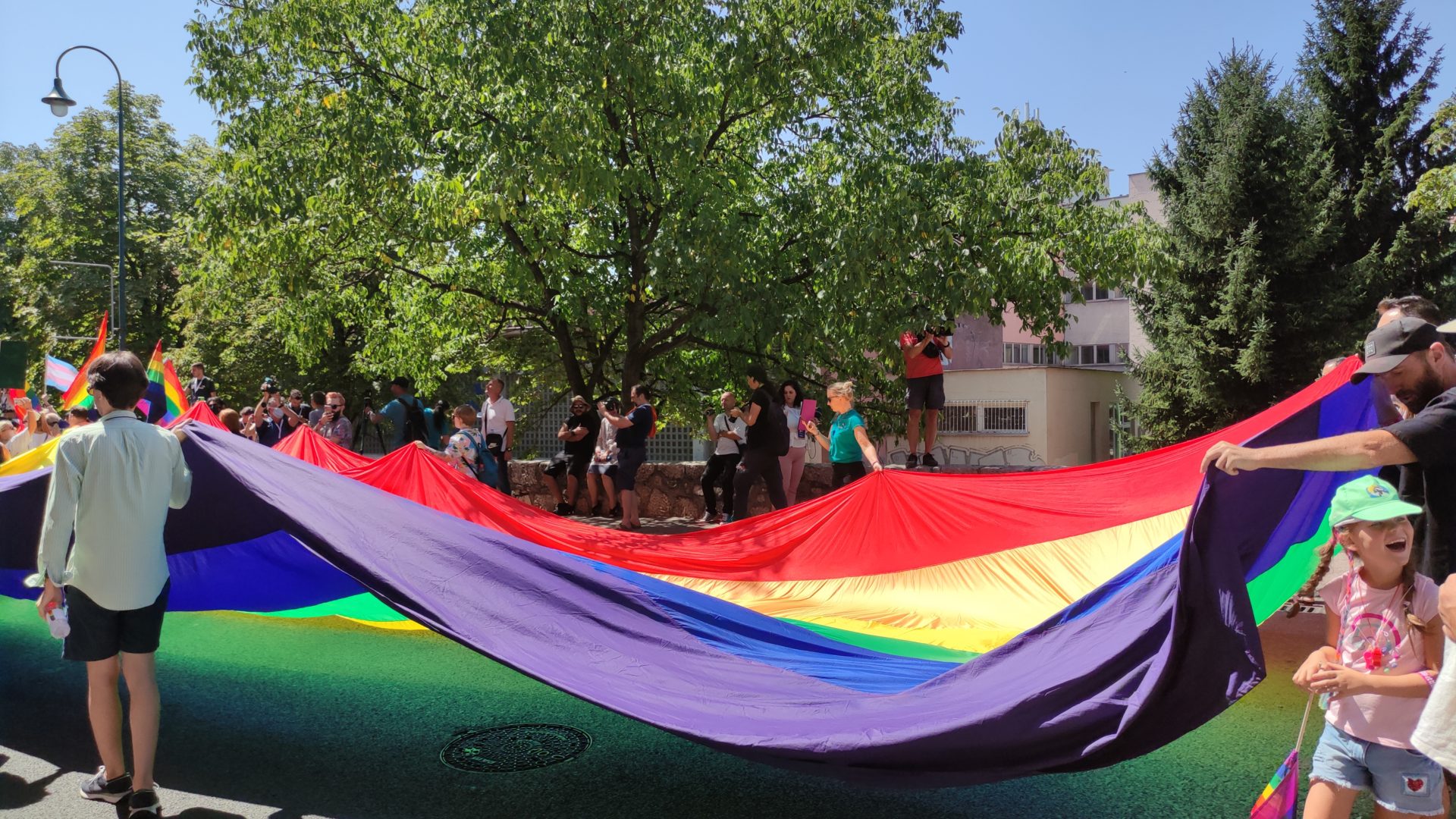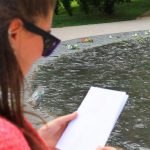
In the Parliament of Montenegro, the Law on Same Sex Life Partnership was passed on July 1, 2020, representing significant and encouraging progress in reducing discrimination against the LGBTIQ community in this part of Europe.
Same-sex partnership in the region is only legal in Croatia. So, while the LGBTIQ community in the rest of the region is still waiting to adopt the same-sex partnership law, the activist community is committed to a common struggle for freedom, equality and love in public space. By organizing protests, they aim to raise the visibility of the needs and problems that LGBTIQ people face daily, in their families, at work, in health care facilities, schools, government institutions, and the public space.
“Many allies and some members of the LGBTI community are unconvinced that it is necessary to organize Pride. What difference does it make? Many of them do not understand the reality of growing up in the closet, hiding, having feelings of shame and fear intertwined with everyday existence. Pride means to be proud – irrevocably proud of who you are and who you love. Love knows no boundaries, and love is always the answer,” says Antonio Mihajlov, a member of the Pride Organizing Committee, Skopje.
The discrimination, homophobia and transphobia to which the LGBTIQ community is exposed in the Western Balkans are still at a high level. These are present in the media, in public speeches of politicians, in comments on social networks, on the street; on the flip side, the level of understanding of the issues faced by this community is still low. That is why the need for protest, and discussing these issues in public space, is even greater, which is also emphasized by Marko Mihailović, a member of the Organizing Committee of Belgrade Pride.
“For this very reason, we organize Pride once a year; we symbolically continue the struggle for better treatment of the LGBTI+ community that lasts every day throughout the year. Belgrade Pride is guided by the slogan ‘We celebrate – we demonstrate’. We fight for the acceptance of the LGBTI+ community and the legal normalization of the position of LGBTI+ people, but we also celebrate our diversity and the fact that we are alive, despite everyday difficulties,” Marko points out.
However, it is very important for activists to show solidarity against the constant discrimination to which many other marginalized groups in our societies are exposed.
“The marches are a space of solidarity, an inclusive and free space for all people who are not well in this socio-political framework. And that is why this is a protest and a fight that will not stop. We hope that with the changes there will be more reasons to celebrate, so that in the future the marches will change their aims,” emphasizes Dajana Bakić, member of the Organizing Committee of the BH Pride Parade.
The struggle for Visibility and Change Over Two Decades
The first pride marches in the region were held in 2001 in Slovenia and Serbia, followed by parades in Croatia (2002), Montenegro and Albania (2013), Kosovo (2017), and Bosnia and Herzegovina and North Macedonia (2019). These events were historic for activist communities in the Western Balkans and for the fight against discrimination and marginalization. Yet the struggle for visibility and change remains difficult, with many challenges posed to the organizing committees of the marches.
In the summer of 2001, LGBTIQ activists attempted to organize the first Belgrade Pride, hoping that Serbia was ready to fight for the human rights of one of the most hated minority communities at the time.
“What awaited the activists was brutal violence by a large number of hooligans and extreme right-wingers, as well as the police, that was insufficiently ready to protect them,” remembers Marko.
The next successful attempt to organize the Belgrade Pride happened in 2010, when the Pride parade successfully marched through the city. On that day, the participants in the procession were protected by 10,000 police officers who clashed with a large number of hooligans. The clash between the police and the hooligans resulted in destruction throughout Belgrade and a ban on organizing Pride for the next three years. Although the Serbian Constitutional Court ruled that the ban was unconstitutional, authorities maintained the ban.
The first peaceful Belgrade Pride was held in 2014 and has been held continuously since then.
“From then until now, every year (except 2020 when we were prevented by the Covid-19 pandemic) we proudly marched through Belgrade and fought to be accepted as normal people who deserve the same access to rights and the same opportunities for a good life as everyone else,” says Marko.
The organization of the first BiH pride parade lasted eighteen months. A number of challenges were set before the organizing committee. Namely, the institutions demanded from the organizers that they finance additional security measures such as anti-terrorist concrete blocks, metal fences, and the engagement of security guards. In this way, they directly transferred the responsibility to the Organizing Committee, to protect themselves from homo / bi / transphobia and potential violence.
It speaks of the reality in which LGBTIQ people live and in which the BiH Organizing Committee works, and the same goes for organizations that today deal with LGBTIQ activism in BiH. In a society where LGBTIQ people are invisible and exposed to daily discrimination and violence, LGBTIQ organizations and parades are becoming safe spaces for work and struggle and therefore need to be strengthened and systematically supported in the mission to make societies equal for all,” says Dajana.
The first BiH pride parade was held in 2019 under the slogan “Coming out” (“Ima izać”), and the event passed without incident. Due to the bad epidemiological situation and the measures that were in force due to the coronavirus pandemic in 2020, a series of street actions and online activities were postponed until the following year, with the slogan “No life within four walls”. Another BiH pride parade was held in August 2021, with the slogan “Resistance from the Margins”. Just before the first and third pride parades, counter-protests called “Anti-LGBT” were held.
As in BiH, the first parade in Northern Macedonia was held in 2019, organized by Skopje Pride, while the second was held in June 2021. In addition to the parade, the Skopje Pride Organizing Committee promoted a series of announcement activities and events, which was a great challenge because, as in other countries in the region, they were a small group with minimal resources. However, the support they received from the community in organizing the procession was above their expectations.
“We have exceeded our expectations in terms of the number of participants in the pride parade itself. We did not have to run a media campaign, because during both May and June, the media – domestic and international – regularly reported on Skopje Pride. We encountered a counter-protest of only 200 participants, which in no way hindered or hampered the organization of the first Skopje Pride, thanks to the great professionalism of the police,” recalls Antonio.
Love Always Wins
Aware that significant change cannot happen overnight, the Pride organizations are determined to persevere in their struggle. It is the only way for decision-makers to start initiating legislative processes that will allow all LGBTIQ people to live a dignified life beyond the margins.
“Our marches on the streets are necessary to make significant and lasting changes in the state of rights and lives of LGBTIQ people, because like all marginalized groups, and most citizens in this country, we live in a difficult economic and social situation, but with added daily discrimination and violence because of who we are. But, it is not just one day when you march, the continuity of the fight is important every day, because there are many problems that must be worked on intensively,” says Dajana.
Regardless of all the obstacles they encounter in everyday life, but also as activists, they believe that by working together they will still win their fight for love and equality.
“We have to hope, be optimistic, and do our best in that fight. We have no other choice. Fortunately, over time, support and alliance grow, and LGBTI people can live more openly and authentically,” says Antonio.
“Love always wins – even when it doesn’t look that way. When Belgrade Pride was banned, we managed to win over many people who showed solidarity with our community. Even when we are in a dark period, the desire for freedom is something that no oppressive regime can take away from us. That is why I think it is important that as LGBTI + people we continue to nurture the spirit of togetherness because together we will win faster than if all of us fight on our own,” concludes Marko.
This article was initially published within the first edition of MIR Magazine (2021/2022). MIR, which means ‘peace’ in Bosnian is an annual publication and platform for young inventive people developed by the Post-Conflict Research Center and Balkan Diskurs. It is dedicated to individuals and organizations that left us a legacy of strongly built foundations to continue our fight for peace and justice.






